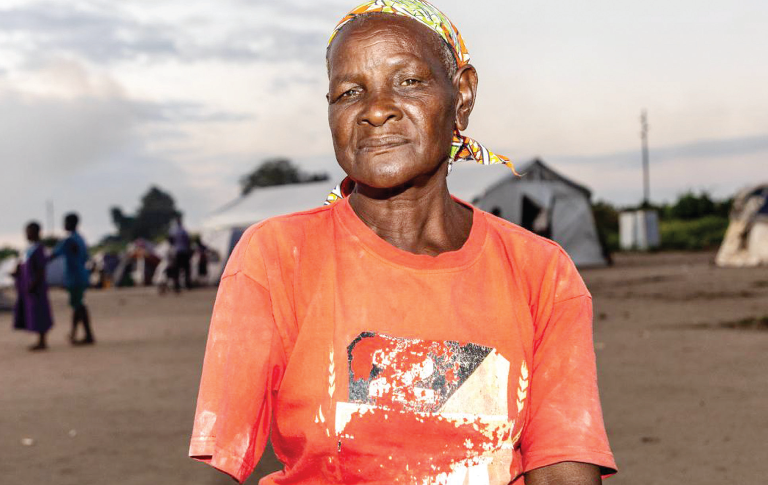Mental first aid for flood survivors
When Tropical Storm Ana struck southern Malawi in January, Aluvinesi Daimoni’s legs froze in surging water and she feared for her life.
Six years earlier, she fiercely fought a crocodile that mauled her left arm while drawing water from Chimbiya River in Chikwawa District.

“My stumpy arm bears an indelible scar,” she says. “Painful memories flooded my mind recently when the crocodile-infested river broke its banks and merged with Nkombezi.”
The flash floods sent people in Matsukambiya Village dashing in all directions, but the elderly woman “couldn’t move a leg”, she says.
Daimoni, 70, was miraculously caught in thorny bushes that drape her low-lying village near Nchalo sugarcane plantation.
“I spent a night in the rain that battered my home and many others to rubble for three days, washing away crops, animals and household items,” she recounts.
Daimoni was rescued by young men who returned to the lowland the following morning to pick up children, the elderly, pregnant women and persons with disabilities left behind.
Abraham Kambewa, who led the search and rescue team, recalls: “The granny was utterly terrified and speechless when we reunited her with her four grandchildren at Nchalo Camp.
“She seldom said a word or mingled with her colleagues. She was so withdrawn and appeared not to understand what she went through.”
Daimoni released her pent-up emotions in May when she received counselling to cope with the tragedy.
“Before talking to the counsellors, I didn’t feel safe living with people who had forsaken me when I needed their support. I didn’t trust anyone, except the young men who rescued me,” she narrates.
Trapped in rising floods, Daimoni feared for her grandchildren.
“I didn’t know if they were dead or alive,” she explains
Their joyous reunion soon gave way to despair as the children spent two weeks without schooling after losing their uniforms, books, pens and other essentials to floods.
Besides, their classrooms at Sekeni Primary School housed the displaced survivors.
“Talking to someone helped me share the inner fears gutting my heart,” Daimoni explains.
The counseling followed training in mental health and psychological support funded by the UK’s Foreign, Commonwealth, and Development Office through Unicef in partnership with Chikwawa District Social Welfare Office.
The training in psychological first aid came in response to the devastation caused by cyclones Ana and Gombe amid the Covid-19 pandemic. The participants included community child protection officers, health workers, police and members of community victim support units.
Daimoni explains: “The support was timely because most organisations have brought food, blankets, buckets and soap to our camp, but nothing much to lessen our mental problems and sense of loss.
“For us, life in the crowded camp was never easy. Just before the floods, we lived peacefully and comfortably in our homes. But we lost everything in no time: our homes, food, and privacy.”
Child protection worker Lysan Mangasanja visited 23 evacuation camps in the sugar-producing area, including Nchalo where Damiano and about 1 500 neighbours of hers lived for six months.
His work helped reduce the suffering of children and vulnerable groups, including the elderly.
Mangasanja explains: “The flooding was devastating and it hit just when Covid-19 had disrupted the livelihoods of many. Some might have thought the world was coming to an end.
“As such, the training in psychosocial first aid helped us, social protection workers, to reach the affected populations with messages of hope just when the loss was having a toll on their mental well-being,” he says.
Mangasanja urges the government and its partners to integrate mental health support into the national disaster response.”
For him, the survivors’ mental well-being is no less important than their physical needs.
“Most of them were grateful to receive food aid and other relief items, but probing further, we were able to hear their hidden worries and address their challenges without having to scratch where it doesn’t itch.”
Chikwawa District Council has committed to embedding mental health and psychosocial support in its response to future humanitarian crises.
Cyclone Ana affected 379 00 people and displaced 117 490 families in Chikwawa, making it the worst-hit district.
The rainstorm displaced 190 000 people from nearly one million affected nationwide, reports the Department of Disaster Management Affairs. Some 46 were confirmed dead and 18 were missing.
Mangasanja said: “We are grateful for the training held in April when some survivors returned home to start rebuilding. We needed it before the tragedy struck, but we’re better late than never.
“We were unprepared and thin on the ground when the catastrophe occurred, but the training helped us work as a team.”






2 Comments